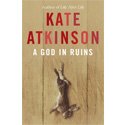 IN BRIEF:
IN BRIEF:
A sprawling story about the life of a decent man who experiences the full horrors of war and then finds himself living in an ‘afterward’ he never expected to have.
Details, details:
What the back cover says:
Kate Atkinson’s dazzling Life After Life explored the possibility of infinite chances, as Ursula Todd lived through the turbulent events of the last century again and again. In A God in Ruins, Atkinson turns her focus on Ursula’s beloved younger brother Teddy – would-be poet, heroic pilot, husband, father, and grandfather – as he navigates the perils and progress of the 20th century. For all Teddy endures in battle, his greatest challenge will be to face living in a future he never expected to have.
What I say:
Does the world need another war book? is always the (rather shameful) question I ask myself before diving into what I know will be a traumatic reading experience.
Then, I remember the 60 million lives lost in WWII. And the words we repeat every ANZAC day – Lest we forget.
We must never stop learning from, and re-imagining the past. Of course we need more books on war. Especially ones like A God in Ruins which, despite its challenging subject matter, is hugely entertaining, informative, and at times, wryly amusing.
Atkinson is a story teller in the best tradition of the title. She takes each aspect of the novel writing process – character, plot, dialogue, research, structure, themes, imagery – and gives them her complete and utter attention. By that I mean the characters are fully realised, the plot is suspenseful (and has a twist), the themes are resonant and supported by recurring motifs.
‘The dead were legion.’
Through her omniscient narratorial voice, Atkinson comments on and through her characters. We get everything. We go forwards, and backwards, and sideways, and in this way, a complete picture emerges.
This is not just a war story. It is a story of the entire 20th century, as told through the prism of Teddy Todd, a war hero. While his war experiences do form the most dramatic centrepieces of the novel, Atkinson takes us fully into Teddy’s life (and that of his family) before and, most importantly, after the war.
How does a man live out his ‘afterward’ when he never expected to have one – and has learned, through the slaughter of war, that civilisation is a mere edifice?
‘He had believed once that he would be formed by the architecture of war, but now, he realised, he had been erased by it.’
Interestingly, the same events are often recounted from multiple points of view. At one point, Teddy takes his grandson, Sunny, to visit a cemetery – a Commonwealth War Graves Commission – 8,000 allied soldiers killed in training flights.
As Teddy tells it – ‘Sunny had ambled off along the rows of the dead. Shoulders up, head down, he never seemed to really look at anything. Perhaps he didn’t want to see.’
Later, Sunny re-tells the visit – ‘He had appreciated the orderliness of the gravestones in the cemetery. He had had to walk away at one point and leave Grandpa Ted in his wheelchair because he had felt tears starting. All those dead guys, it was so sad. They were his own age, doing something noble, something heroic. They were lucky. They’d been given history. It wasn’t going to happen to him. He was never going to be given the chance to be noble and heroic.’
History is contested territory and Atkinson writes eloquently on this in the novel, and at the end, in an author’s note which alone justifies the price of buying the book.
In fact, there are so many reasons to buy this book, but I need to name two more – one is the dreadful Viola, Teddy’s daughter, who is in both parts amusing and horrifying. For me, the book really kicked into gear the minute Viola appeared. The second reason is for the extraordinary depth of research, which Atkinson handles so beautifully that the seams of it barely show. You learn, but you don’t realise it. Perfect.
There is a twist at the end, which some readers may find a little dispiriting. Personally, I thought it fitted perfectly with the themes of the novel – a situation in which form and content were in synergy.
A God in Ruins is in fact the second book with a World War II backdrop that I’ve read this year – the other was All the Light We Cannot See – which was also absolutely brilliant.
Perhaps the question is not Do we need more war books? But – is the reading world enhanced by these books?
Yes. The answer is yes.
 About the author:
About the author:
Kate Atkinson was born in York and now lives in Edinburgh.
She won the Whitbread (now Costa) Book of the Year prize with her first novel, Behind the Scenes at the Museum. Her four bestselling novels featuring former detective Jackson Brodie became the BBC television series Case Histories, starring Jason Isaacs. Her last novel, Life After Life, was the winner of the Costa Novel Award and the South Bank Sky Arts Literature Prize, and was shortlisted for the Women’s Prize. It was also voted Book of the Year for the independent booksellers associations on both sides of the Atlantic. Her new novel, A God in Ruins, is a companion to Life After Life, although the two novels can be read independently.
She was appointed MBE in the 2011 Queen’s Birthday Honours List, and was voted Waterstones UK Author of the Year at the 2013 Specsavers National Book Awards.
For more information, to read a free sample, or purchase the book, visit Random House
